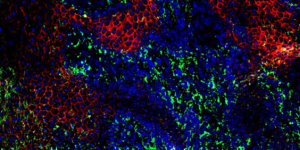
Image: Skin cells at the edge of a diabetic wound. Red and green colors depict two proteins involved in the release of exosomes from these cells (CREDIT: Subhadip Ghatak).
McGowan faculty Mohamed S. El Masry, PhD; Subhadip Ghatak, PhD; and Sashwati Roy, PhD, alongside McGowan Associate Researcher Anu Sharma, PhD; Research Assistant Piya Das Ghatak; and Director of the McGowan Institute Chandan K. Sen, PhD, recently authored a study published in Nano Today.
The study, titled “Nanoscopic and functional characterization of keratinocyte-originating exosomes in the wound fluid of non-diabetic and diabetic chronic wound patients,” provides insight into why wounds often heal poorly in patients with diabetes.
“In patients with diabetes, wound healing is impaired because of excess inflammation,” said Dr. Sen. When exosomes, small particles that carry information between cells, do not function properly in patients with diabetes, inflammation can increase and impair wound healing.
Researchers collected bandages containing wound fluid from 22 diabetic and 15 non-diabetic patients in order to isolate and examine exosomes.
They found that if signals contained within the exosomes were correct, then inflammation in the wound would ultimately be resolved. However, they found that diabetic exosomes, or “diaexosomes,” compromised wound healing and led to the production of pro-inflammatory compounds.
“Diaexosomes drive deviation from the healing cascade, so that resolution of inflammation is compromised,” said Dr. Sen. “And this isn’t just limited to wounds. Because exosomes are responsible for many functions in the body, diaexosomes could play a role in other diabetic complications.”
“Left untreated,” Dr. Sen continued, “these non-healing, or chronic, wounds can lead to limb amputations. More than 100,000 diabetes-related amputations occur in the U.S. each year, but by understanding more about wound healing and developing new therapies, our goal is to bring down this number.”
Read more from UPMC here.
Check out Dr. Chandan Sen’s feature on Talk Pittsburgh with host Heather Abraham.
